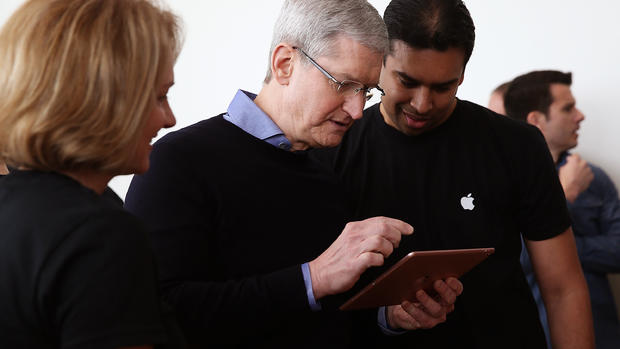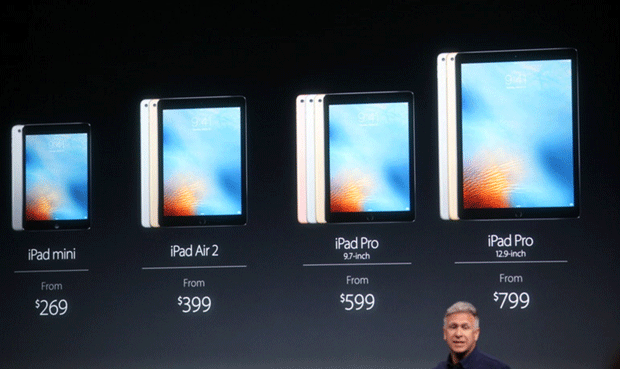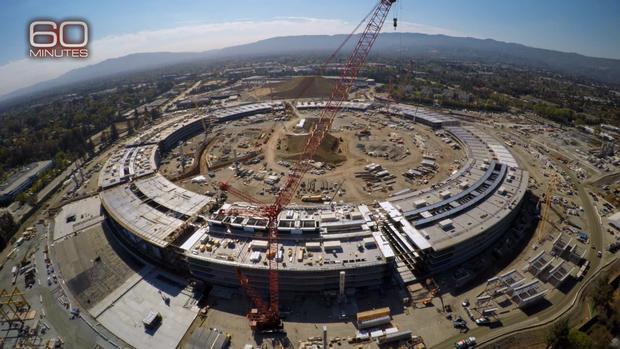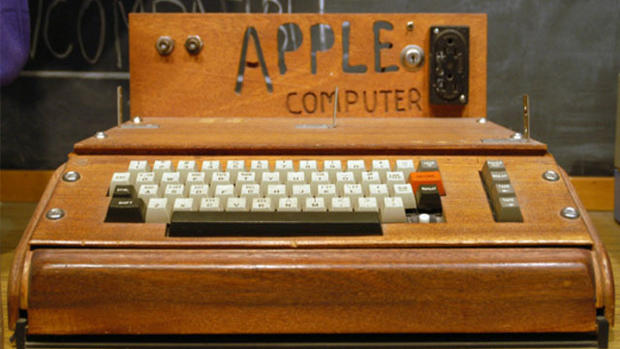iPhone SE unveiled; Apple vows to protect customer privacy
Apple (AAPL) CEO Tim Cook kicked off the company's spring 2016 product launch by vowing to defend the privacy of its technology.
"We believe strongly that we have a responsibility to help you protect your data and protect your privacy," Cook said Monday, alluding to Apple's bitter legal fight with the government over an iPhone used by San Bernardino gunman Syed Rizwan Farook. "We owe it to our customers and we owe it to our country. This is an issue that affects all of us and we will not shrink from our responsibility."
Noting that the iPhone is "a deeply personal device," Cook said, "we need to decide as a nation how much power the government should have over our data and over our privacy."
Turning to the product rollout, Apple introduced a smaller iPhone that packs some of the newer technology used in the latest generation of iPhones. Dubbed the iPhone SE , the device comes with a 4-inch screen, but is as fast and powerful as the iPhone 6S, said Greg Joswiak, head of iPhone marketing.
It's "the most powerful 4-inch phone ever created," Cook said.
The new trimmed-down device, which also has a 12 megapixel camera and enhanced security features, starts at $399. The company is taking orders for the new iPhone starting on Thursday. It will be available in stores on March 31.
In a move to boost sagging tablet sales, Apple is also adding a new iPad, a 9.7-inch version of the larger iPad Pro. A 32 gigabit version will go for $599, while 128 GB and 256 GB models are available for $749 and $899, respectively. Online sales start Thursday.
Apple cut the price of other iPads: the iPad Air 2 will now start at $399, while the iPad Mini will go for $269.
Addressing the Apple Watch, which first hit the market last year, Cook said that starting Monday its lowest-cost model will be priced at $299. New bands for the smartwatch are also available, including new sport and leather bands in a range of different colors.
Apple released a new update to its mobile operating system, iOS 9.3. Available now, iOS 9.3 includes a new feature called Night Shift, which automatically adjusts the display colors on your screen to warmer hues in the nighttime hours so it won't interfere with sleep. There are also enhancements for the News, Notes and Health apps.
Apple typically unveils new products and software twice a year, in the spring and fall. At its last big press event, in September, the company introduced the iPhone 6s and iPhone 6s Plus as well as the larger iPad Pro.
Market trends
A smaller and less expensive iPhone would fill a niche in the market left behind by the recent emphasis on super-sized smartphones.
Starting in 2014, with the iPhone 6 and 6 Plus, Apple embraced the trend toward bigger screens, which have proven hugely popular for Samsung and other competitors as well. The screen on the iPhone 6s ($649) measures 4.7-inches diagonally. The 6s Plus ($749) is a hefty 5.5-inches, the same as the new Samsung Galaxy S7 Edge (which also boasts of being waterproof).
A surge in iPhone sales led Apple to record quarterly earnings in the last three months of 2015. The company reported $75.9 billion in revenue and net income of $18.4 billion for the quarter. Overall, the iPhone contributed nearly two-thirds of Apple's $234 billion in revenue for 2015.
The company says more than 1 billion Apple devices -- iPhones, iPads, Mac computers and laptops, Apple Watches and more -- are actively in use around the world.
But Apple is projecting lower revenue this quarter, between $50 billion and $53 billion, and many industry analysts have raised concern that the market has reached "peak iPhone," limiting opportunities for future growth. Apple's stock price has fallen 15 percent over the last 12 months, reflecting investor fears that the company may struggle to expand.
"Last year was an unprecedented year for Apple and the iPhone.... You'll never see that type of growth from the iPhone again," Angelo Zino at S&P Capital IQ told CBS News when the earnings report came out in January.
When it comes to sales of this year's model, "We think the numbers will be modest," RBC Capital Markets analyst Amit Daryanani told the Associated Press. Steven Milunovich of UBS predicts Apple could sell 12 million of the new, smaller phones this year, compared to 265 million of the larger iPhone 6 models sold over the last two years.
Initial reactions to Apple's latest wares were mixed, with CNET's Jeff Bakalar suggesting that the company's new gear lacks inspiration.
Meanwhile, speculation has already begun about Apple's next generation iPhone 7, which is expected to be unveiled in the fall.
As for tablet sales, while Apple did not break down sales figures for different devices, analysts say sales of the iPad and the tablet market overall have been slowing for several years, and it's unlikely another new model will do much to change that. Market analysis firm IDC reported that tablet shipments were down 10 percent worldwide in 2015; while Apple remained the market leader, it still experienced a 24.8 percent decline from the year before.
Our partner site CNET notes that the 12.9-inch iPad Pro, though well-received by some graphics and media professionals, hasn't been widely embraced by the public. Competition from Android tablets, running software from Google parent Alphabet (GOOG), has taken a toll. And with more people toting smartphones with larger screens, fewer seem to see the need for a tablet-sized device.
Encryption controversy
Of course, Apple finds itself under intense scrutiny over much more than just today's product announcements. The company is in the midst of a very public legal battle against the FBI over government demands that it help unlock an iPhone used by one of the San Bernardino terrorists.
A court date was scheduled for Tuesday for arguments in the case, but late Monday the Justice Department said it would seek a postponement while it pursues another possible way of accessing the phone without Apple's assistance.
The case centers around security measures enabled on gunman Syed Rizwan Farook's iPhone. Investigators believe the phone may contain valuable information about the attack that killed 14 people on December 2 or the terrorists' other plans or contacts, but the FBI has been unable to access it because the data would be permanently erased after 10 wrong password attempts.
Apple is fighting a federal magistrate judge's order to write software that would allow investigators to get around that security feature. In court filings, the company claims that a so-called "back door" into the phone is "too dangerous to build" and would undermine the privacy and security of millions of users around the world, potentially leaving them "vulnerable to hackers, identity thieves, hostile foreign agents and unwarranted government surveillance."
"For many years, we have used encryption to protect our customers' personal data because we believe it's the only way to keep their information safe," Apple CEO Tim Cook wrote in a public letter to customers. "We have even put that data out of our own reach, because we believe the contents of our iPhone are none of our business."
The government, for its part, insists the request is limited to this one phone (although similar requests are pending in a number of criminal cases) and that other users have nothing to fear.
"The Constitution and the three branches of the federal government should be entrusted to strike the balance between each citizen's right to privacy and all citizens' right to safety and justice. The Constitution and the laws of the United States do not vest that power in a single corporation," the Justice Department said in a statement.
President Obama, speaking at the South By Southwest (SXSW) Interactive festival in Austin, Texas, earlier this month, seemed to encourage a middle ground.
"My conclusion so far is that you cannot take an absolutist view on this," Mr. Obama said, without mentioning Apple specifically. "So if your argument is strong encryption, no matter what, and we can and should, in fact, create black boxes, then that I think does not strike the kind of balance that we have lived with for 200, 300 years. And it's fetishizing our phones above every other value. And that can't be the right answer."
In a CBS News/New York Times poll released Friday, Americans remained divided. Fifty percent of the more than 1,000 people surveyed said Apple should unlock the phone, though nearly as many, 45 percent, think it should not.



